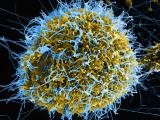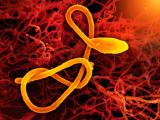Treatment of Ebola patients in US high-containment facilities offered a rare opportunity to monitor the illness and recovery phases with sophisticated tests, and researchers who poured through the findings reported today on immune system clues for both moderate and severe forms of the disease.
The clues could help guide the design of future treatments, the authors said.
Researchers from the US Centers for Disease Control and Prevention (CDC), Emory University School of Medicine, and the University of Nebraska Medical Center reported their findings yesterday in Clinical Infectious Diseases.
Using samples from 7 US patients, the scientists followed 54 different immune-system markers from hospital admission until discharge. Of the 7 patients, 5 had moderate Ebola infections and 2 had a severe form of the disease that required mechanical ventilation and dialysis.
Monitoring all the different biomarkers allowed researchers to observe several Ebola infection processes, including inflammation, coagulation, endothelial function, and lymphocyte function, according to the study. Most patients had central lines in place for the medical teams to administer fluid and medication, which streamlined the regular, frequent collection of blood samples.
Successful immune components
Lead author Anita McElroy, MD, PhD, said in a CDC press release today that investigators were able to identify the immune system components that successfully fought off the virus. "These are the parts of the immune system that we need to tap into to develop new therapies," she said. McElroy, on the faculty at Emory, is a guest researcher with the CDC's Viral Special Pathogens Branch.
The team found that those with moderate disease had strong, healthy immune responses that were able to control Ebola infection.
On the other hand, they also identified key patterns in patients with severe illness who had a tougher time fighting the virus. Those patients had high viral blood levels along with an extreme immune-system overreaction that led to destruction of healthy tissues, multisystem organ failure, and sometimes death.
All five patients with moderate disease survived their Ebola infections; one of the two severely ill patients died.
Potential factors
It's not clear why some people's immune systems respond more effectively to viruses, but possible contributors could include genetics and whether a patient has underlying medical conditions. Teasing out which parts of the immune system misfire in severe Ebola illness, as well as those that perform well in those with moderate illness, could be a key to developing therapies that might help patients battle the virus.
For example, medications to downregulate immune signaling pathways could inhibit an overactive immune response, and administering interferon might help other treatments, the authors wrote. "Not only will using the correct therapies be important, but also the timing of administration will be critical. Immune inhibition, if initiated at an inappropriate time, could be detrimental to the host." They noted that the biomarker data they found builds a case for greater testing of potential immunomodulators for Ebola treatment in animal models.
Despite the study's small sample size and that some of the patients were treated late in their illnesses, the extensive collection of biomarker data can be useful for better understanding which molecular and cellular pathways play key roles in Ebola pathophysiology, the authors noted. They added that the next step is to come up with testable hypotheses about the processes and test them in appropriate animal models.
See also:
Jun 28 Clin Infect Dis abstract
Jun 29 CDC press release


















